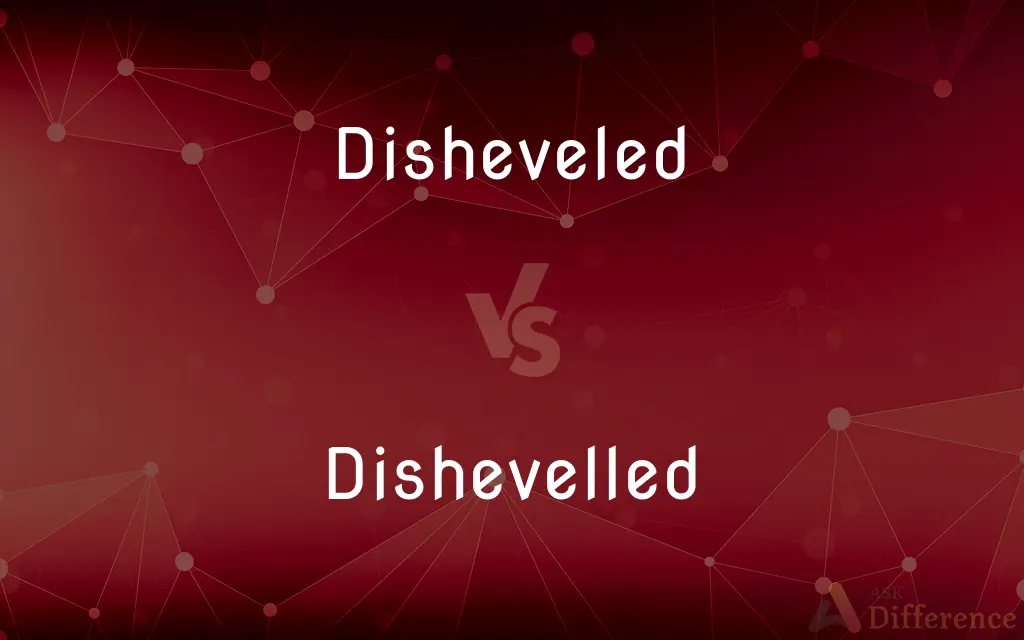Disheveled vs. Dishevelled — What's the Difference?
By Urooj Arif & Fiza Rafique — Updated on April 7, 2024
Disheveled and dishevelled refer to the same state of untidiness, differing only in American (single "l") and British (double "l") spelling.

Difference Between Disheveled and Dishevelled
Table of Contents
ADVERTISEMENT
Key Differences
Disheveled, with one "l", is the American English spelling of the term, denoting someone or something that looks untidy, especially in terms of clothing or hair. This spelling is commonly used in American publications and is consistent with the American English trend of simplifying words. Dishevelled, on the other hand, is the British English spelling, featuring an extra "l". It conveys the same meaning: a state of untidiness or disarray, particularly in appearance. This spelling variation reflects the typical differences between American and British English, where British English often retains more traditional spellings.
While the difference in spelling might suggest regional usage, both forms convey the same degree of untidiness. Whether one uses disheveled or dishevelled depends largely on the intended audience or the regional standards of English being followed. This distinction is purely orthographic and does not imply any difference in degree or kind of untidiness represented.
The usage of either term is a matter of orthographic convention rather than a difference in meaning. In contexts where American English is preferred, disheveled is the standard spelling. In contrast, British English settings will favor dishevelled. This distinction is one of many examples of how spelling can vary between English dialects without affecting the meaning of words.
Despite the spelling difference, both terms are used to describe a similar aesthetic or state. Whether referring to someone's disheveled hair after a gusty wind or a dishevelled appearance following a long journey, the implication is the same: a noticeable lack of order or neatness. This consistency across dialects underscores the shared core of the English language, despite regional variations in spelling and expression.
In literature and everyday language, whether one encounters disheveled or dishevelled largely depends on the origin of the text or the preference of the writer. English speakers worldwide understand and use the term (in either spelling) to describe a lack of tidiness, demonstrating the flexibility and adaptability of English across different regions and cultures.
ADVERTISEMENT
Comparison Chart
Spelling
American English spelling with one "l"
British English spelling with two "l"s
Meaning
A state of untidiness, especially in appearance
The same state of untidiness, with no difference in meaning
Usage
Used in American publications and writings
Preferred in British publications and writings
Orthographic Origin
Reflects American English’s trend towards simpler spellings
Retains traditional spelling used in British English
Contextual Use
Chosen based on the regional standards of English being followed
Similarly chosen based on the preference for British English standards
Compare with Definitions
Disheveled
Often used to describe someone’s appearance after physical activity.
After the marathon, every runner looked disheveled.
Dishevelled
Applicable to areas or items showing signs of neglect or chaos.
The abandoned office was dusty and dishevelled.
Disheveled
Can also refer to objects or spaces in disarray.
The wind left the backyard looking disheveled, with furniture overturned.
Dishevelled
Marked by an untidy or disorderly appearance.
He looked dishevelled after being caught in the rain.
Disheveled
Looking untidy or disordered, especially in appearance.
He arrived at the meeting looking disheveled, with his tie askew.
Dishevelled
Denoting a lack of neatness or order, particularly in personal grooming.
Her dishevelled appearance was out of character.
Disheveled
Characterized by a lack of order or neatness in dress or appearance.
Her disheveled hair suggested she had rushed to get there.
Dishevelled
Indicative of a general state of untidiness or disarray.
The house was in a dishevelled state after the party.
Disheveled
Reflecting a state of disarray or untidiness.
The disheveled state of the room indicated a hasty departure.
Dishevelled
Commonly used to describe the look of someone post-exercise or physical exertion.
The football team appeared dishevelled but victorious.
Disheveled
Being in loose disarray; unkempt, as hair or clothing.
Dishevelled
Dishevelled (Dsh) is a family of proteins involved in canonical and non-canonical Wnt signalling pathways. Dsh (Dvl in mammals) is a cytoplasmic phosphoprotein that acts directly downstream of frizzled receptors.
Disheveled
Marked by disorder; untidy
A disheveled pile of books on the library table.
Dishevelled
To loosen and let fall (hair or clothing) in disarray.
Disheveled
Alternative form of dishevelled
Dishevelled
To disarrange the hair or clothing of.
Disheveled
Simple past tense and past participle of dishevel
Dishevelled
To throw into disorder.
Disheveled
Hanging in loose disorder; disarranged; in disarray; not made neat; - used especially of hair or clothing; as, disheveled hair.
Dishevelled
Being in loose disarray; unkempt, as hair or clothing.
Disheveled
Having the hair in loose disorder.
The dancing maidens are disheveled Mænads.
Dishevelled
Marked by disorder; untidy
A disheveled pile of books on the library table.
Disheveled
In disarray; extremely disorderly;
Her clothing was disheveled
Powder-smeared and frowzled
A rumpled unmade bed
A bed with tousled sheets
His brown hair was tousled, thick, and curly
Dishevelled
(of a person) With the hair uncombed.
Dishevelled
(by extension) Disorderly or untidy in appearance.
Dishevelled
Simple past tense and past participle of dishevel
Dishevelled
In disarray; extremely disorderly;
Her clothing was disheveled
Powder-smeared and frowzled
A rumpled unmade bed
A bed with tousled sheets
His brown hair was tousled, thick, and curly
Common Curiosities
When should I use disheveled vs. dishevelled?
Use disheveled when writing in American English and dishevelled for British English contexts.
Can disheveled/dishevelled describe spaces or objects?
Yes, both terms can describe anything in a state of untidiness or disarray, not just personal appearance.
Are there many words like disheveled/dishevelled with such regional spelling differences?
Yes, English contains many such examples, including color/colour, honor/honour, and labor/labour.
Is there a difference in meaning between disheveled and dishevelled?
No, there is no difference in meaning; the variation is purely orthographic, reflecting American vs. British spelling conventions.
Is the use of disheveled/dishevelled common?
Yes, both versions are commonly used to describe untidiness in personal appearance or in environments, depending on the dialect of English.
Can changing between disheveled and dishevelled affect my writing's perception?
It might, depending on the audience. Using the spelling preferred by your audience can make your writing more relatable to them.
Will using one spelling over the other be considered incorrect?
In most contexts, neither spelling is considered incorrect, but using the version appropriate for your audience is advised.
Does the spelling difference impact pronunciation?
The spelling difference does not significantly impact the pronunciation in this case.
What does disheveled/dishevelled mean?
Both spellings refer to a state of untidiness or disorder, especially concerning appearance.
How do I know which spelling to use?
The choice depends on the regional version of English you are using or targeting in your writing.
How can learning about these differences benefit my English?
Understanding regional spelling differences can improve your writing's clarity and audience engagement across different English-speaking regions.
Are there rules for when to use American or British spellings?
Generally, the choice depends on your location, audience, or the standards of the publication or institution for which you are writing.
Can the context change the meaning of disheveled/dishevelled?
The context can clarify what specifically is untidy but doesn’t change the basic meaning of the word.
Why are there different spellings in American and British English?
Historical, cultural, and linguistic evolution has led to variations in spelling, grammar, and usage between the two dialects.
Share Your Discovery

Previous Comparison
Suboscine vs. Oscine
Next Comparison
Tritanopia vs. ProtanopiaAuthor Spotlight
Written by
Urooj ArifUrooj is a skilled content writer at Ask Difference, known for her exceptional ability to simplify complex topics into engaging and informative content. With a passion for research and a flair for clear, concise writing, she consistently delivers articles that resonate with our diverse audience.
Co-written by
Fiza RafiqueFiza Rafique is a skilled content writer at AskDifference.com, where she meticulously refines and enhances written pieces. Drawing from her vast editorial expertise, Fiza ensures clarity, accuracy, and precision in every article. Passionate about language, she continually seeks to elevate the quality of content for readers worldwide.















































